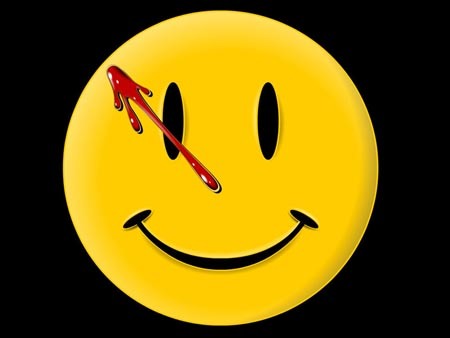
Now with a day to have completely digested the announcement of DC’s decision to move forward with a collection of Watchmen prequels, not to mention an extended discussion with a friend, I’ve ultimately concluded I dislike the move.
With various mini-series focusing on Dr. Manhattan, Rorschach, The Minute Men, The Comedian, Ozymandias, Nite Owl and Silk Spectre, the summer releases will touch on and interpret the lives of these characters for the first time (outside the film) since Alan Moore wrapped up the original series over two decades ago. Watchmen is one of the most revered comic books in the medium’s history, one which has been included consistently on lists compiling the top literary works. And it’s completely warranted. At its core the book was a character analysis of the superheroic idealization and depiction of the modern superhero, breaking down their motivations for becoming a vigilante while highlighting their virtues as well as their vices. Moore’s work humanized each of them, while concurrently celebrating their shortcomings as individual characters. It forced us to look at heroes through another lens which in turn forced us to really look hard at their ethics and morality as it relates to their actions. The book(s) grounded those characters in reality, and despite the story being rooted in the fantastic, his analysis of heroism, vigilante psychology and the moral/ethical implications of action have not been met since. The story itself was a complete work which told its story to perfection.
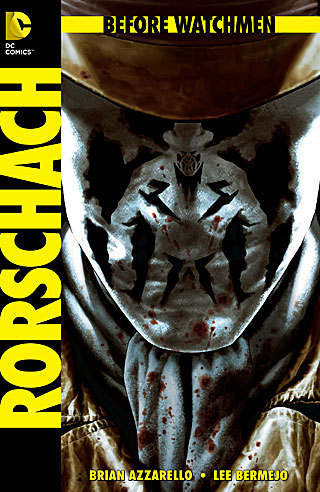
So I must posit the question. Why revisit their universe? What do these books add or do to enhance the content? What will the creative teams do in so far as paying homage to Moore’s graphic novel? While I can’t go so far as to decisively state they won’t, to presume this decision wasn’t economically motivated due to the state of the industry is naive. I have a friend who characterized the Watchmen prequels as DC’s big red panic button, the button encased in a glass covering, accompanied by the message, “In case of emergency, break glass,” that would be pressed by DC editorial as a last resort. I believe he’s right, and considering the nature of the relaunch of DC titles, this should have been expected. Regardless, this is a delicate project, which despite the inclusion of Brian Azzarello and J. Michael Straczynski as part of the creative teams, I’m unsure whether this is necessary. In fact, it’s not and the more I contemplated these books the more agitated I became.
“The flip-side to that question, then, is ‘Why do anything based on something that was well done?’ It’s weirdly counter-intuitive: the characters are great, the world is terrific, we created something amazing here, so, God — let’s never ever do that again,” Straczynski said in an interview with Comic Book Resources.
While I can see his point, I find his conclusion disagreeable. Not only does it feel like a writer toeing the company line, but I challenge the mentality seemingly possessed by JMS that they should do it because they can. I doubt that any of the writers truly have something to add to any of their characterizations, much less a way to present the material in a way that enhances the purpose of Watchmen. They can try, but in the end I can’t help but feel a degree of pretension at the thought of the effort. This simply isn’t a matter of DC looking to move the story, this is a matter of the company hoping to boost sales with a move that, regardless of fan reactions to the prequels, will be picked up by all, all the same. This will be a lucrative move for the company, yet I can’t help but consider the absence of creativity in the move and the stories that may be produced where the purpose doesn’t seem so much the need to tell a story as it is the need produce a story to increase total revenues.
Mr. Straczynski spoke of logical thought in relation to the decision to move forward without Alan Moore’s blessing, however his logic fails say, if we use his own Superman example. The difference being, as far as Superman and Watchmen is concerned, is that by the time Alan Moore wrote his Superman stories, the ongoing title had been in publication for nearly 50 years. Its continuing nature lends itself to creative changes, not to mention, that as a serial, the book will never end. Watchmen is a different matter, as it’s a 12 issue maxi-series which was written with the intent of telling a story about the nature of the superhero and the humanity buried underneath the perception of their godliness. It’s a complete work without the need for re-visitation. This move is what it is, and it smells of desperation.
“God help us all.”

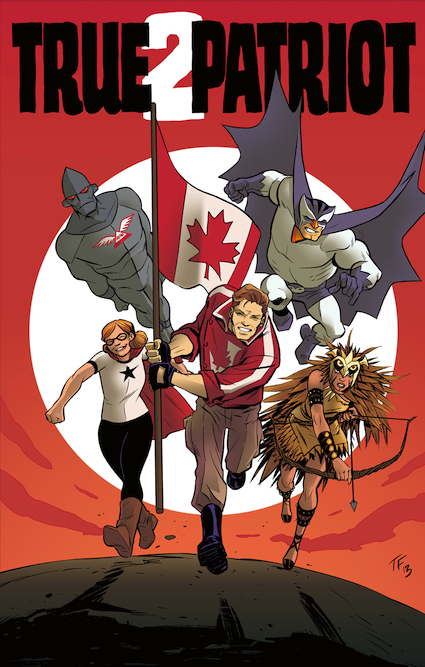
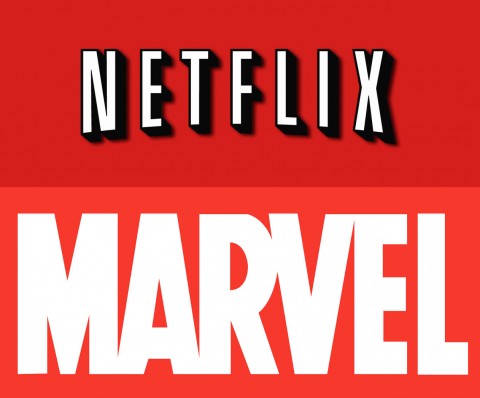
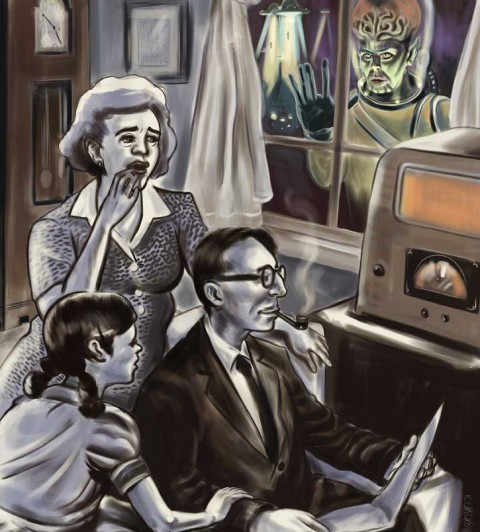
Is DC in business to do something other than make money? The best way to support your opinion is to not purchase any of the Before Watchmen comics.
I get what everyone is saying, it’s really not a legal issue, it’s a moral one. (and yes, I’m aware of all the ‘Moore uses public characters in his work argument) I believe that this is just another example of how morally bankrupt the comic industry is towards it’s creators. It’s a thankless job.
The thing that really irks me is Straczynski’s comments about working on Watchmen 2 and comparing it to if someone were to do a Babylon 5 prequel.
““So now – apples to apples – let’s make the B5 comparison,” he continued. “Let’s say Warner Bros. came to me and said, ‘we want to do more Babylon 5, and we want you to run the whole thing. We’ll pay you anything you want, give you a proper budget, and you will have complete creative freedom.’ […] So let’s say that Warners makes that offer, and I said, ‘No, I don’t want it, take your accursed money, your big budget and your complete creative freedom and begone, get thee behind me Satan!’ Let’s say they came back and said ‘Okay, then how about we pay you vast sums of money just to consult? How about that?’ […] ‘What if we sweeten the deal? What if we offer to give you full ownership of Babylon 5, legally and contractually, so you own it? How about that?’”
The point is that Moore doesn’t trust DC/Warners at this point. He’s been burned by them quite a few times. Moore is a difficult person in general and he’s obviously a flawed man, but there was an initial agreement that the rights would revert back to him, David Brothers at 4thletter.net puts it best
“Moore and Gibbons were supposed to gain ownership, or something similar, once the book had been out of print for a year. From what I’ve heard, it was a good contract, totally reasonable… but the book they made was so good that it generated so much demand that taking it out of print would be throwing away dollars. The future came out of nowhere and screwed up the plans.
Once DC Comics realized that, though, I think they should have renegotiated with the creative team to keep it in print, give them some share of the rights, and then get together to take money baths down at the bank. Instead, they went for the short-term gain, and now the trail of destruction that sits between DC and Alan Moore is unforgivable. They had a chance to make good, to not pull all of the tricks the comics industry is known for pulling, and didn’t. Their short-term business sense said that taking the money and running was a good idea. Long-term thinking would’ve told them that giving Moore and Gibbons what they agreed on, and then nurturing that relationship over the next 25 years, would have let them make a ton of money. It’s a complicated situation and I’m (obviously) not an entertainment lawyer, but I genuinely believe that it should have gone down differently. There’s a moral aspect that should not have been ignored.”
So, yeah – basically what Scotty said: vote with your wallet. This is something that’s going to make a lot of money, and has with the exception of Straczynski alot of visionary and creative voices attached to it.. but for me, it just seems wrong.
I like this write up and I like Peters comments because I think it reflects sentiments that many of us share.
Is DC in business to do something other than make money?
Yes there are. They have corporate responsibilities to uphold… transparency, values, ethics and promises they’ve made whether written or implied.
I don’t think anyone wants to discourage DC from making money but it’s a question of how they go about doing it… and if what they are doing is truly in their best interest. So the issue is one of taste and leadership.
Unfortunately, the law does not make the distinction between the “letter” and the “spirit” of a contract…
Historically, prequels and sequels are rarely as good as the original (the only exceptions that come to mind are Aliens and T2). Still, it’s not to say that it’s not possible… so politics aside, I’m looking forward to this and I’ll judge these books on their own merit.
Speaking of the “big red panic button”…
I can tell you that many companies do turn to rebranding as a last resort… their current efforts do feel somewhat desperate so I was thinking the same thing. No doubt DC has a lot of pressure to make the numbers from Time Warner but hopefully they do have a viable plan beyond a shiny new logo.
Where was this uproar when IDW did an anthology of Dave Stevens’ Rocketeer? That was a complete story, with nothing additional needed or required. Yet a group of talented creators threw in their two cents and it was so successful a second series has been announced.
Totally different things Scott.
The only difference is that Dave Stevens isn’t around to say anything about it. Plus a lot less people read Rocketeer.
I’d say the new Rocketeer stuff is more like little tribute pieces, rather than being part of cannon. I thought the same of the newer Spirit material. Maybe it’s good, maybe it’s worthy, but is it part of the whole? No. Sometimes Lucas insists Star Wars is just the six films, other times it expands.
this is an interview with Peter David and he does a pretty good job at summing it up.
Peter David (from newsarama interview)
When you’re talking about “creators,” I suspect you’re mostly talking about Alan Moore. David Gibbons’ judicious phrasing about the endeavor, I think, expresses a positive mindset in seeing the work as a tribute, an homage, especially when one considers that Watchmen began its creative life as an updating of the Charlton characters; if it had remained that, then Moore would have had nothing to say about ownership to begin with, “draconian” contracts or no.
I think Moore is on more slippery grounds, asserting that these prequels are DC’s simply depending upon 25 year old ideas of his, implying that it’s a sign of some sort of creative bankruptcy. Yes, Moore — whom I’ve never had the honor of meeting — is correct that there is no sequel to “Moby Dick.” But Moore’s position is odd considering he took characters created by Jules Verne and Bram Stoker and turned them into superheroes, and transformed beloved literary heroines into subjects of erotica. Does public domain automatically make one morally superior in recycling the iconic characters created by authors who are no longer around to voice their protests? Considering his Moby Dick comparison, apparently he doesn’t think so. Does the fact that it’s a corporation taking the initiative rather than a single individual automatically make the endeavor inferior? That’s a hard argument to make considering that a corporate entity desiring to utilize its properties led to “Watchmen” in the first place. The fact that Moore is so vehemently opposed to the other authors working upon his characters — characters that are pastiches of Charlton Comics creators — might tell you something about how L. Frank Baum would likely have reacted to Moore’s handling of Dorothy. And if that’s the case, people who stridently protest Watchmen prequels might want to reconsider the moral validity of their ire.
To me, DC’s announcement simply means that Alan Moore’s work has reached the iconic status of such characters as Superman and Swamp Thing, about both of whom Moore has graced us with some of the most compelling and memorable stories ever told. Let us hope that the storytelling bar that Moore has set in his own work on other people’s creations will be met — and perhaps even exceeded — by those who are now following his lead.
I think Peter David misses the point terribly here.
Superman and Batman are great concepts in the context of their place in time, but Watchmen was never about the characters. If Miller’s work on DD proved anything, it’s that characters are only as good as the stories that are told about them.
The genius of Watchmen is that it reflects mans struggle; that good is not completely good, and evil is not completely evil. The characters are just faces on our values and represent the different kinds of “thinking” towards the same problem… and it’s all wrapped up in a murder mystery. It’s Shakespearean because Moore is writing about us!
Is DC trying to franchise the characters or Watchmen? Eventually it may lead to character franchises but currently, these books are an extension of the Watchmen… why else would it be called “Before Watchmen”?
Does the fact that it’s a corporation taking the initiative rather than a single individual automatically make the endeavor inferior?
Not necessarily “inferior” although historically it most likely will be… but it does suggest that this is no “tribute” or “homage”.